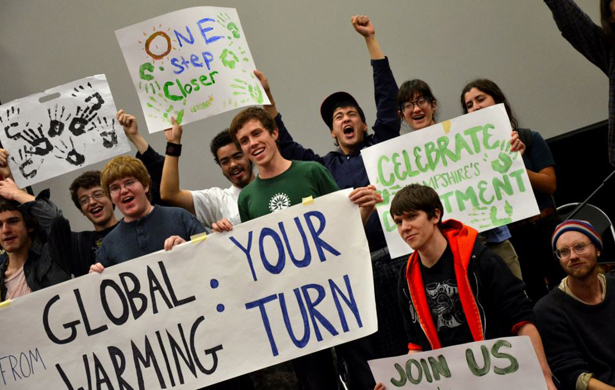
Credit: Students for a Just And Stable Future
In the 1980s, students across the United States pushed their schools to divest from companies that supported apartheid in South Africa. Today, college students are using the same tactic by calling on their universities to divest from fossil fuel companies. This new movement aims to address what South African Archbishop Desmond Tutu calls the human rights issue of our time: global warming.
The economic and human cost of the climate crisis is increasingly being felt in the United States and around the world. This summer’s drought across the Midwest foreshadowed the possibility of our nation’s breadbasket turning into a permanent dustbowl. Recently, Hurricane Sandy demonstrated the terrifying consequences of rising ocean temperatures and increasingly powerful storms. Globally, the outlook is grim: some estimates predict that 100 million people are could die in the next eighteen years because of climate change and the impacts of fossil fuel use.
The world is currently on track for a catastrophic 6 degrees Celsius warming, despite three decades of increasingly desperate warnings from scientists. Grassroots efforts to alter individual behaviors have failed to create the necessary scale of change. The fossil fuel industry has shown its willingness to use unimaginable wealth to suppress even the weakest of climate bills. Despite past failures and in the face of new challenges, the student wing of the climate movement has been infused with energy and hope over the past few months as the fossil fuel divestment movement spreads.
Fossil fuel divestment campaigns now exist at forty-seven colleges and universities nationwide. More campaigns are expected to kick off as 350.org’s Bill McKibben travels to twenty cities across the country in November on his Do the Math tour. The tour, which aims to promote divestment and energize the climate movement, originated from an article published by Rolling Stone last August. McKibben laid out the shocking mathematical reality of the climate crisis: the top 200 publicly traded fossil fuel companies own 2,795 gigatons of carbon in their reserves, but if more than 565 of those gigatons are burned, then it will be difficult for the environment to stay under 2 degrees Celsius of warming (the upper limit considered safe by the UN). The battle to prevent the climate crisis is clear: either fossil fuel corporations change their practices soon or more people will find their lives and livelihoods irreversibly and tragically altered.
Popular
"swipe left below to view more authors"Swipe →At Harvard University, the campus chapter of Students for a Just and Stable Future launched Divest Harvard, calling on the administration to divest Harvard’s endowment from the top 200 publicly traded companies that own the majority of fossil fuel reserves. Harvard has a $30.7 billion endowment—the largest of any university in the world. While the endowment lacks transparency, students have received confirmation from the CEO of HMC that Harvard is invested in the fossil fuel industry, and public SEC filings confirm investments in fossil fuel companies like Petrobras and WPX Energy. Harvard’s enormous wealth gives it the power to directly weaken fossil fuel corporations and send a strong message to other investors by divesting. Harvard also has the moral authority to stake a claim against the fossil fuel industry and take a lead in this movement.
The Divest Harvard campaign grew quickly after launching in September of this year, mobilizing undergraduates, graduate students, faculty and staff. Students have petitioned, hosted educational events and participated in a National Day of Action for Fossil Fuel Divestment with seventeen other colleges. Over 1,000 Harvard community members and several student groups have endorsed the campaign, and the undergraduate student body will soon vote on whether to support fossil fuel divestment during student government elections next week.
Harvard President Drew Faust has called sustainability “one of the paramount issues of our time” and the university has made an effort to live up to that statement through campus greening efforts. For instance, Harvard committed to ambitious greenhouse gas reduction goals, installed renewable energy and became the first higher education institution with fifty LEED-certified buildings. However, the positive impact of campus projects is inconsequential when compared to the climate damage done by Harvard’s investments in fossil fuel corporations. And, to great disappointment, President Faust has repeatedly affirmed her support for Harvard’s fossil fuel investments, stating in meetings and public forums that the endowment is not a tool to pursue social goals and exists solely to fund the university.
In response, students point to several examples where Harvard has used its money for social good. The university fully divested from tobacco corporations for public health concerns and partially divested from apartheid South Africa for human rights reasons. Today, the climate crisis threatens the survival of millions, if not billions of people, and yet President Faust—in a public meeting—insisted that Harvard divests only in the “most extreme of circumstances” and that she does not “feel compelled to do that at this time.”
In the face of the Harvard administration’s continued resistance to fossil fuel divestment, student support for the Divest Harvard campaign has grown stronger. Meanwhile, the national divestment movement continues to spread, spurred on by recent success at Unity College and the increasing sense of urgency after Hurricane Sandy. Students are the sleeping giant that rose to end apartheid and fight for many other just causes. Now more and more students are mobilizing against business as usual in the fossil fuel industry.


